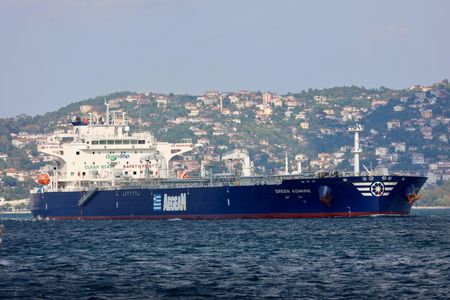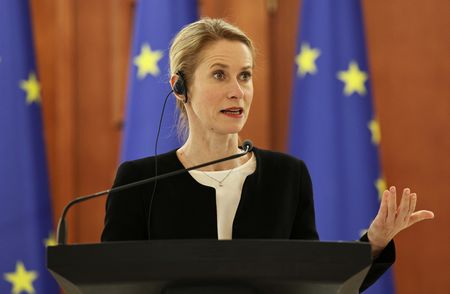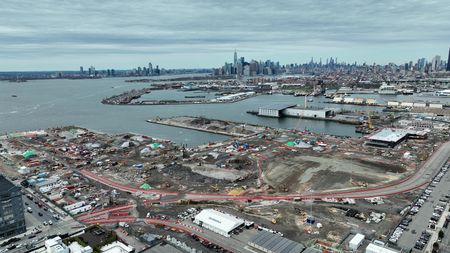COPENHAGEN (Reuters) -Russia has released a Greek-owned oil tanker which was detained in Russian waters on Sunday after leaving an Estonian port, and the vessel has resumed its journey towards the Dutch port of Rotterdam, Estonian public broadcaster ERR reported on Tuesday.
The detention of the vessel has increased concerns over potential escalation in busy Baltic sea lanes where major oil supplies pass through, after separate action by Estonia in recent days to stop tankers as part of enforcing Western sanctions on Russia.
“Expect heightened maritime security risks, particularly around vessels transporting oil from or to Baltic ports, including the increased likelihood of arbitrary detentions, military posturing, and freedom of navigation impediments,” UK maritime security company Ambrey said in a note on Tuesday.
The Liberia-flagged Green Admire appeared to be underway in the Baltic Sea on Tuesday with its destination listed as Rotterdam and was estimated to arrive there on May 24, according to ship tracking data on the MarineTraffic platform.
The vessel’s Athens-based manager Aegean Shipping did not immediately respond to a request for comment. Norway’s Skuld, one of the tanker’s insurers, declined to comment on Tuesday.
Green Admire has not yet registered with Rotterdam’s port authority centre but is expected to do so shortly, a port authority spokesperson said.
The vessel had left the Sillamae port in Estonia using a designated navigation channel that crosses Russian territorial waters after which it was detained, the Estonian Foreign Ministry said on Sunday.
Estonia’s foreign minister has said Russia’s action against the Green Admire was likely a response to a campaign by the Estonian navy to inspect tankers used to transport millions of barrels of Russian oil through the Baltic Sea.
‘SHADOW FLEET’ TANKERS
The spokeswoman of Russia’s foreign ministry on Tuesday accused NATO of trying to control Baltic shipping lanes and she said that Moscow would react to any unlawful actions by vessels of the Atlantic alliance’s member states.
“NATO is trying to present the Baltic Sea as its own internal sea,” Maria Zakharova told a weekly briefing in Moscow.
Russia, rejecting Western efforts to pressure its oil exports over its war in Ukraine, has turned to hundreds of so-called ‘shadow fleet’ tankers to transport cargoes to buyers in Asia.
The vessels typically have opaque ownership structures and sail without top-tier Western insurance or safety certification cover. They often have unknown insurers or assessors of vessel seaworthiness – both required for ocean-going commercial ships, shipping and insurance industry sources familiar with the matter have said.
“It is a realistic possibility that if Baltic Sea nations continue to strengthen their adversarial posture toward the sanctioned vessels in their waters, Russia will likely conduct reciprocal actions in the maritime domain, including detentions, seizures and plausible deniability attacks,” Ambrey said.
“The vessels operating in Estonian and Finnish waters are assessed as most likely targets for detentions.”
Estonia said on May 19 that all commercial traffic to and from Sillamae would be routed through Estonian territorial waters, which Ambrey said was likely “to limit exposure to Russian jurisdiction and military pressure”.
The EU and Britain announced new sanctions against Russia on Tuesday without waiting for the United States to join them, a day after President Donald Trump spoke to Vladimir Putin without winning a promise for a ceasefire in Ukraine.
Apart from specific sanctions, the Group of Seven countries is also set to review a price ceiling on Russian oil sales locked at $60 a barrel.
The EU will propose to G7 finance ministers this week to lower the current price cap to $50 a barrel. If approved, this would add to the heat faced by Moscow.
(Reporting by Jonathan Saul, Stine Jacobsen, Renee Maltezou and Bart Meijer,Editing by Gareth Jones)











